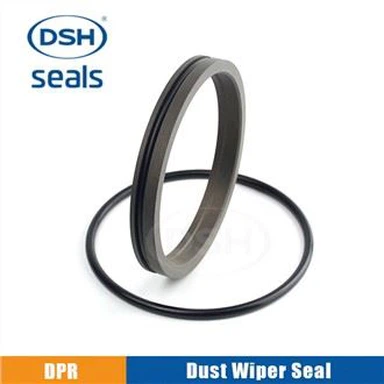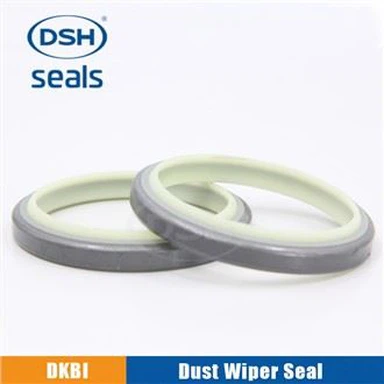Characteristics Of Hydraulic Seal Materials
Oct 18, 2022
一. The characteristics of "metal material" of hydraulic seal material
Encyclopedia of metal sealing materials: Metal Material (Metal Material; ferrous metals, non-ferrous metals and special metals.) refers to the general name of metal elements or materials with metal properties mainly composed of metal elements. Including pure metals, alloys, metal intermetallic compounds and special metal materials.
The medium and characteristics of the synthetic "silicon" of the hydraulic seal material:
The synthetic metal sealing material in the sealing material can rotate at the same time under high pressure, especially high pressure or high temperature. Compared with the previous sealing materials, this is incompetent with other sealing materials. , At this time, only metal materials are used to make hydraulic auxiliary seals. According to different working environment (occasion) conditions, there are different metal sealing materials to choose from. For example, the sealing materials of metal hollow O-type seals are 0Cr18Ni9/0Gr18Ni12Mo2Ti/1Cr18Ni9Ti, etc., and the end face is triangular.
The wedge-shaped gaskets are usually made of chrome copper, such as 0Cr13. For flat pads, copper or aluminum pads are mostly used.
Under the conditions of high pressure and high temperature working environment (occasion), the strength and elasticity of the above-mentioned sealing materials will be significantly reduced. At this time, heat-resistant alloys, such as high-nickel alloys, are used, and their strengths at high and low temperatures are Good, good wear resistance; nickel-molybdenum alloy, its corrosion resistance material is good, no heat treatment, high strength.
二.The characteristics of the hydraulic "fluorine" of the auxiliary hydraulic seal material of the seal
The synthetic fluorine in the seal material means that this type of seal is added with fluoroolefin copolymer during synthesis. In the industry, fluorine is a kind of sealing material with the largest material in production. The two common types of fluorine in the market are the fluorine 26 type and the main fluorine 23 type.
The fluorine 23 type of the seal is the product of a copolymer of vinylidene fluoride and chlorotrifluoroethylene. It is equivalent to a kind of foreign Kel-F fluorine, it has very good resistance to strong acid, especially the resistance to fuming nitric acid is very good, that is, this type of fluorine has great difficulty in processing.
Fluorine 26 type of seals is a sealing material suitable for fluorine products. In order to adapt to various industries (uses), this type of fluorine has many varieties. Common materials are fluorine 26 type and fluorine 246 type. Fluorine 26 type is more inclined to the product of the substitute polymer of fluorine 2-ene and hexafluoropropylene, which is equivalent to the fluorine variety of foreign ITI0. Its heat resistance and solvent resistance are estimated to be fluorine type 33, except for this individual case. , the fluorine-33 type is basically replaced by the fluorine-23 type. The fluorine 246 type is biased towards vinyl fluoride, hexafluoropropylene, tetrafluoroethylene terpolymer, its characteristics are heat resistance, solvent resistance performance is even better than the fluorine 26 type. The fluorine used in the sealing auxiliary seal is mainly fluorine 26 type.
The fluorine of the seal has particularly good heat resistance, corrosion resistance, good resistance to superheated water, and good superheated steam performance. It can be used stably for a long time under the temperature of 250 degrees Celsius, and it is more widely used in the occasions with corrosion resistance and high temperature resistance (working environment, medium resistance condition), the big disadvantage of the sealed fluorine material is that it is not resistant to ammonia water and strong alkali , organic acid, concentrated acetic acid, acetone, ether, ethyl acetate, etc.
三. Performance characteristics of "soft stone" of seal material
Small knowledge of stone encyclopedia: silicon is an allotrope of the element carbon, and the periphery of each carbon atom is connected with three other broken atoms (multiple hexagons arranged in a star and bee pattern) by covalent bonds. , forming a covalent molecule. [1] Since each micro-atom subtracts one electron, those electrons can move freely, so the stone is a conductor. Graphite is one of those soft materials, and its uses include pencil leads and bone emollients.
The medium and characteristics of the synthetic "silicon" of the hydraulic seal material:
The synthetic graphite in the seal material not only has the excellent thermal stability, chemical stability and high thermal conductivity of ordinary graphite, but also has unique compressibility and good resilience. It can run for a long time in high and low temperature working environments (occasions), and soft graphite can be preferentially used for general seals. Due to the low strength of soft graphite, more attention should be paid to strengthening and protection.
Molded into rectangular seals (square seals), wedge seals (wedge seals), and soft graphite for gaskets (seals) The seal, the bellows assembly of the metal bellows seal and the static sealing gasket connecting the shaft sleeve.
四.The medium and characteristics of "Dingqing", the material of auxiliary hydraulic seals
The medium and characteristics of the synthetic "Dingqing" of the hydraulic seal material:
The synthetic nitrile in the seal material is one of the sealing materials used (selected) for a common seal, because the nitrile sealing material has excellent oil resistance and aging resistance, and has good wear resistance. it is good. Its performance is related to the content of acrylonitrile. The content of acrylonitrile is high, so it has good oil resistance. Its strength, hardness, wear resistance, and water resistance increase, but its corrosion resistance, elasticity and low temperature performance deteriorate. Auxiliary seals generally use high acrylonitrile-containing nitrile, which should be synthesized according to the actual medium conditions.
Xiqing has excellent corrosion resistance to mineral oils, animal and vegetable oils, and aliphatic hydrocarbons, but it is worth noting that it is not resistant to phosphate ester hydraulic oil, strong acids, aromatic hydrocarbons, esters, ketones, ethers, halogenated hydrocarbons and other media. abrasive media properties.







